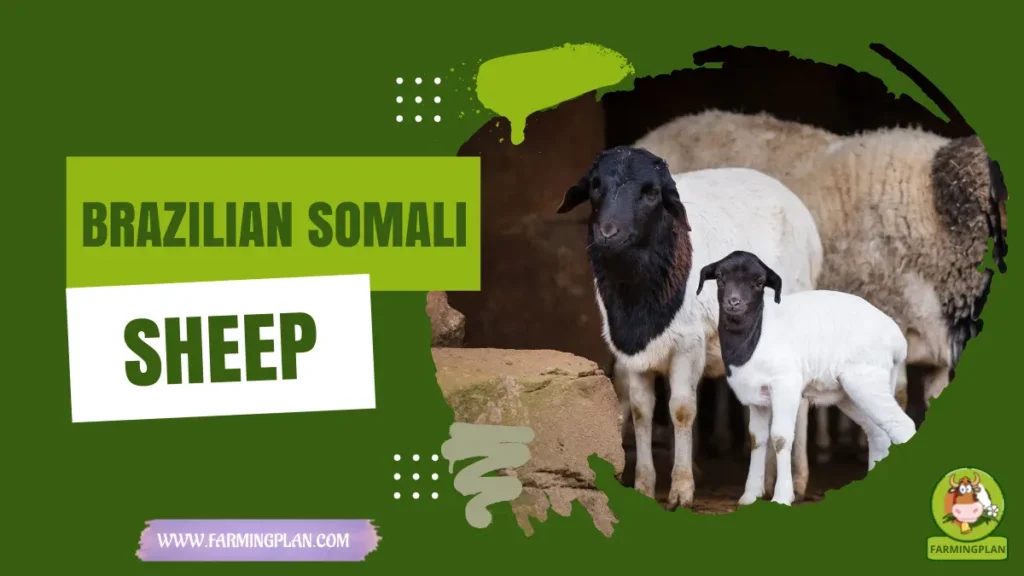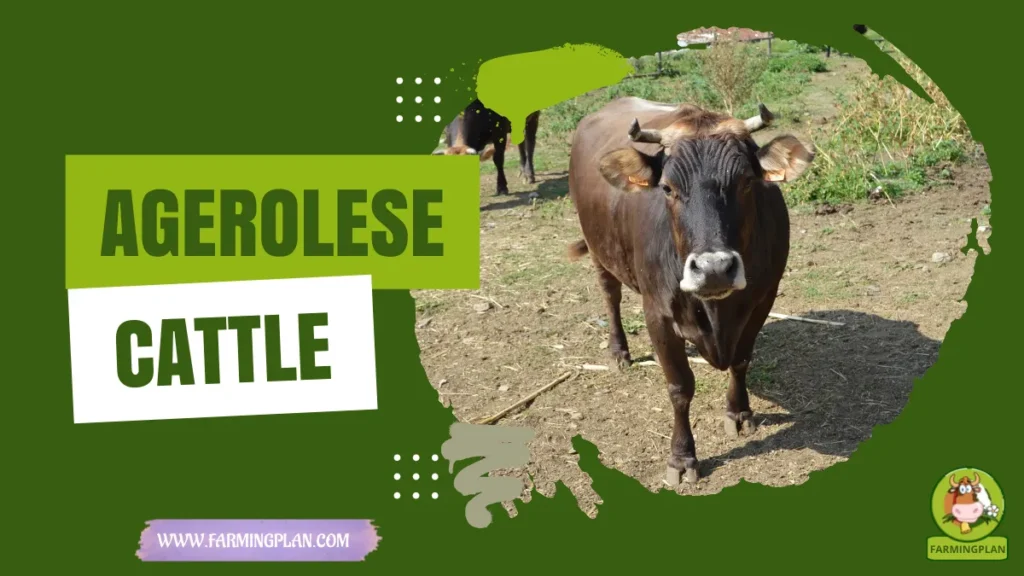Are you looking to start a profitable and sustainable livestock farming business? Then look no further than the Brazilian Somali Sheep, a unique breed of sheep that has been bred in Brazil since the late 19th century. The hardy black or white Texas-style variety of sheep flourishes in tropical climates and they have distinctive spotted markings that make them not only attractive candidates for sale on the market but also prolific producers. If you’re ready to get your hands dirty with an exotic breed of farm animals, then read on to learn all about how to successfully begin your own Brazilian Somali Sheep farm!

History & Origin
The Brazilian Somali Sheep is a unique breed of sheep that has captured the attention of many people worldwide. Originating in Africa, the breed was brought over to Brazil in the late 19th century and has since then, been slowly gaining popularity among farmers in the region. One of the distinct features of this breed is its ability to adapt to the harsh conditions of the Brazilian climate, thereby making it a preferred choice for many farmers. Its wool is considered to be one of the finest in the world and is therefore, highly sought after. Not only does it make for durable clothing, but the wool also serves as an important source of income for many farmers who earn their livelihood by rearing these sheep. Despite being a rare breed, the Brazilian Somali Sheep has made a significant impact on the agricultural industry in Brazil and continues to be an important part of the local farming community.
Characteristics
Brazilian Somali sheep are a unique breed of sheep that have distinctive characteristics that set them apart from other breeds. They have a beautiful, long fleece that protects them from the harsh climate in Somalia. Unlike other sheep breeds, the Brazilian Somali sheep are known to thrive in areas with sparse vegetation and arid conditions. These sheep have a docile temperament and are easy to handle, making them an ideal choice for livestock farmers. Their hardiness, unique appearance, and adaptability make them a favorite among sheep breeders and enthusiasts alike. Over the years, Brazilian Somali sheep have become increasingly popular due to their superior meat quality, making them a valuable addition to any farm.
Feed
Brazilian Somali sheep is a unique breed that originated in Somalia and is now popular in Brazil. It is an interesting breed that is known for its ability to withstand a range of weather conditions. Feeding these sheep is an important aspect of their well-being as they require a balanced diet that consists of a variety of food sources. It is essential to provide them with good quality hay and fresh water at all times. Supplementary feed such as grains and pellets can also be added to their diet. A healthy and nutritious diet will not only keep these sheep healthy but will also enhance their growth and productivity. Remember, it is important to ensure that the sheep get adequate nourishment as their meat and wool are highly valued in the market.
Usage
Brazilian Somali sheep may not be the first animal that comes to mind when thinking about livestock. But this unique breed has been gaining popularity for its adaptability and hardiness. Originally from the hot and arid regions of Somalia, this breed has adapted well to the humid Brazilian climate. These sheep are known for their exceptional resistance to parasites, which means they require fewer chemicals and medications in their care. Additionally, their meat is highly valued for being lean and flavorful, making them a great option for those interested in sustainable and ethical farming practices. Overall, Brazilian Somali sheep offer a promising alternative for farmers seeking a low-maintenance and high-reward breed.
Special Feature Of Brazilian somali sheep
If you’re looking for a new, unique addition to your flock of sheep, you might be interested in the Brazilian Somali Sheep. These sheep have a distinctive appearance, with long, curly hair and prominent horns. They were originally bred in Somalia but have since been introduced to Brazil, where they have become popular for their hardiness and adaptability to hot climates. In fact, they are often used for meat and dairy production in Brazil. The Brazilian Somali Sheep may not be the most well-known breed, but they are certainly worth considering if you’re searching for a sheep that stands out from the crowd.
Identify a suitable location
When it comes to starting a farm for Brazilian Somali Sheep, there are a few factors that need to be considered. One of the most important aspects is finding a suitable location with ample space and access to water sources. With their preference for warm climates and open spaces, it’s best to search for a location that offers ample sunlight and plenty of room for grazing and roaming. Additionally, access to water sources such as rivers, streams, and wells is crucial to ensure that the sheep have a constant supply of water. By selecting the ideal location, you can give your Brazilian Somali Sheep the perfect environment to thrive and grow.
Secure the necessary permits
If you’re interested in importing Brazilian Somali Sheep, it’s important to secure the necessary permits and licenses from the relevant authorities. While the process might seem daunting, it’s critical for ensuring that your business is operating legally and ethically. To start the process, you’ll want to research the specific requirements for importing livestock into your country. This might involve obtaining permits from the Department of Agriculture, securing licenses from the Ministry of Livestock, or meeting other regulatory standards. By investing time and energy into securing the necessary paperwork, you’ll be able to bring these unique and fascinating animals into your community safely and responsibly.
Set up a secure perimeter for your flock
Keeping your Brazilian Somali Sheep safe should be a top priority, and setting up a secure perimeter for them is one of the first steps. Not only will it keep out unwanted predators and other animals, but it will also give your sheep a sense of security. It’s essential to make sure the fence is tall enough to prevent jumping or climbing over it and secure enough to prevent digging. Providing your sheep with an adequate shelter is also crucial. It should be accessible and offer protection from the elements, such as wind, rain, and sun. By ensuring your flock has a safe and comfortable place to live, you can help them thrive and enjoy a happy and healthy life.
Practice good animal husbandry
If you’re a proud owner of Brazilian Somali Sheep, you know that caring for these beautiful animals goes beyond providing them with food and shelter. Practice good animal husbandry by ensuring they get regular veterinary checkups, vaccinations, and parasite prevention treatments. Sheep can be particularly vulnerable to a wide range of illnesses and parasites, so it’s important to stay on top of their healthcare needs to ensure they live long, healthy lives. By keeping up with their regular checkups and preventative treatments, you can keep your Brazilian Somali Sheep happy and healthy for years to come.
FAQ
What are the characteristics of Brazilian Somali sheep?
The Brazilian Somali sheep breed is a unique and fascinating type of sheep that has garnered a lot of attention in recent years. Known for their striking appearance and strong physical characteristics, these sheep are a favorite among farmers and breeders around the world. What sets them apart from other breeds is their distinctive hair coats, which can range from a soft and fuzzy texture to a long and luxurious style. Additionally, Brazilian Somali sheep are known for their hardiness and adaptability, making them well-suited for a variety of different climates and environments. With all of these notable characteristics, it’s no wonder why Brazilian Somali sheep are such a popular choice for those in the farming and agriculture industries.
How many sheeps are in Somalia?
Somalia is widely known for its livestock industry, particularly its sheep population. However, finding an exact number of how many sheep are in Somalia isn’t an easy task. The country boasts a large nomadic population, and many of these individuals rely on their sheep for their livelihood. As a result, the number of sheep varies depending on different factors such as the season, region, and market demands. Despite this variability, it’s no secret that sheep play a vital role in Somalia’s economy and culture. Moreover, the country’s unique arid and semi-arid climate is ideal for raising sheep, making them a prominent feature of the landscape. So the next time you find yourself in Somalia, keep an eye out for these adorable animals!
Where are sheep found in Somalia?
Somalia may not be the first country that comes to mind when thinking about sheep, but surprisingly, there is a breed of sheep that is uniquely adapted to the hot and dry climate of this African nation. The Brazilian Somali Sheep, as they are commonly known, are a hardy breed that can tolerate high temperatures and little water. They can be found grazing in the arid regions of Somalia, where they provide wool, meat, and milk for the local communities. Despite their ability to thrive in such a harsh environment, the Brazilian Somali Sheep are still endangered due to the effects of drought, overgrazing, and civil unrest in the area. Nonetheless, they remain a symbol of resilience and adaptability in an often challenging landscape.
Conclusion
Thus, the Brazilian Somali sheep is a unique breed of sheep that has truly earned its place in farming and livestock circles due to its impressive characteristics. Its short tail, white or black colouration, distinctive markings, and overall temperament make it an ideal choice for farmers and ranchers all over the world who are looking to add variety to their animal stock. It is important to note that while raising this breed of sheep can be relatively easy, setting up a farm requires thoughtful consideration. When planning for your flock’s care, make sure you identify a suitable location with ample space and access to water sources, as well secure the necessary permits and licenses from the relevant authorities before proceeding. With good animal husbandry practices such as regular veterinary checkups and parasite prevention treatments, this special breed of sheep can form part of an exciting livestock journey.

